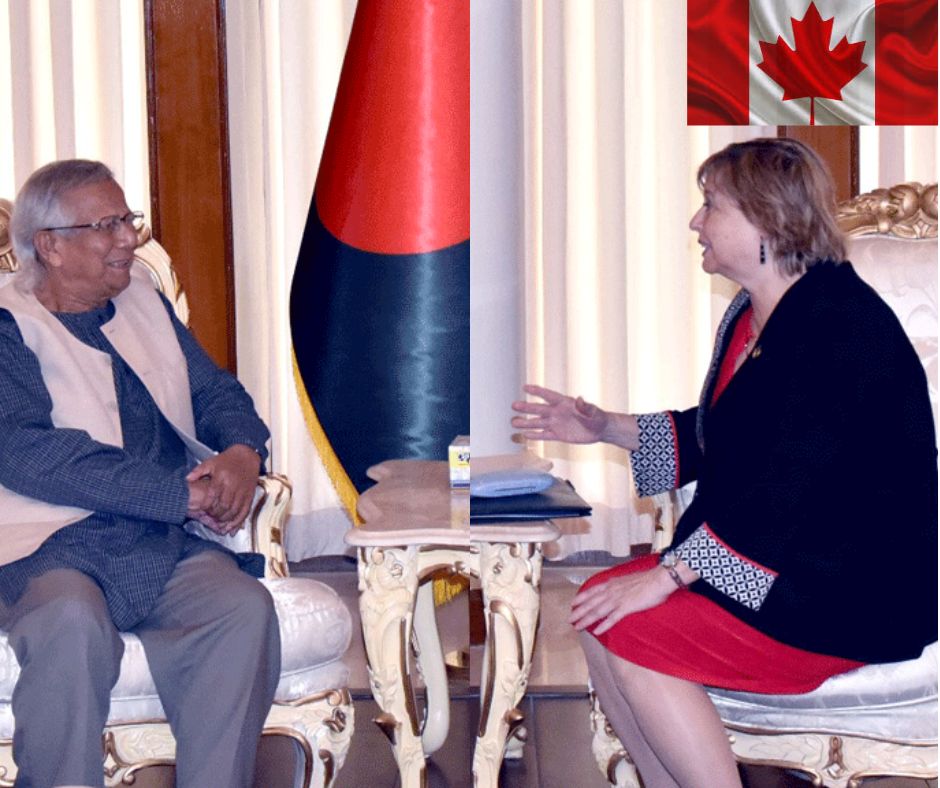
Bangladesh is currently navigating a complex economic landscape, burdened by substantial debt and the lingering effects of economic disruptions. In light of these challenges, the Chief Advisor of Bangladesh, Professor Muhammad Yunus, has extended a significant invitation to Canada to invest in the country’s rebuilding efforts. This call was made during a meeting with Canadian High Commissioner to Bangladesh, Lilly Nicholls, at the state guesthouse Jamuna on Wednesday.
Context and Significance of the Meeting
The meeting between Professor Muhammad Yunus and High Commissioner Lilly Nicholls is not just a routine diplomatic engagement but a crucial step towards deepening bilateral ties between Bangladesh and Canada. Given the global economic uncertainties and Bangladesh’s own economic difficulties, this invitation carries substantial weight.
The discussion comes at a time when Bangladesh is facing a critical need for foreign investment to stabilize its economy and restore the functionality of key institutions that have been weakened over time. The Chief Advisor’s appeal underscores the urgency of attracting substantial foreign capital to aid in economic recovery and growth.
Historical Ties Between Bangladesh and Canada
Professor Yunus highlighted the longstanding relationship between Bangladesh and Canada, emphasizing the shared history of political and economic collaboration. This historical context is pivotal, as it lays the foundation for future cooperation in addressing the current economic challenges faced by Bangladesh.
Bangladesh and Canada have maintained robust diplomatic relations since Bangladesh’s independence, with Canada playing a supportive role in various developmental initiatives. Over the years, Canada has contributed significantly to Bangladesh’s development in areas such as education, health, and governance. Professor Yunus’s reference to this history serves as a reminder of the mutual benefits that both nations have derived from their relationship and the potential for future collaboration.
The Current Economic Crisis in Bangladesh
Bangladesh is grappling with several economic challenges, most notably a high level of national debt and a disrupted economy. These issues have been exacerbated by global economic conditions, including the ongoing effects of the COVID-19 pandemic, supply chain disruptions, and inflationary pressures.
The Chief Advisor highlighted the critical state of Bangladesh’s economy, particularly the need for large-scale investments to address these challenges. He pointed out that the government’s top priority is to “fix the economy,” and foreign investment is seen as a key component of this strategy.
Investment Opportunities for Canada
During the meeting, Professor Yunus made a compelling case for Canadian investment in Bangladesh, identifying several sectors where Canadian expertise and capital could have a transformative impact. These sectors include agriculture, technology, infrastructure, and manufacturing, all of which are crucial for Bangladesh’s economic recovery and long-term growth.
Agricultural Sector
Bangladesh’s agricultural sector is vital for its economy, providing employment to a significant portion of the population and contributing to food security. However, the sector faces challenges such as outdated farming techniques, climate change impacts, and a lack of modern infrastructure.
Canada, with its advanced agricultural technologies and practices, could play a crucial role in modernizing Bangladesh’s agriculture. Investments in this sector could help enhance productivity, improve food security, and create sustainable livelihoods for millions of Bangladeshis.
Technology and Innovation
The technology sector is another area where Canadian investment could be highly beneficial. Bangladesh is striving to become a digital economy, with the government aiming to transform the country into a knowledge-based society by 2041. Canadian expertise in technology, particularly in areas like information and communication technology (ICT), could support this vision.
Investment in the ICT sector could lead to the creation of new jobs, foster innovation, and improve the overall competitiveness of Bangladesh’s economy on the global stage.
Infrastructure Development
Infrastructure development is a critical area where Bangladesh requires substantial investment. The country’s infrastructure, particularly in transportation and energy, needs significant upgrades to support economic growth and attract further investment.
Canadian firms with expertise in infrastructure development could contribute to building roads, railways, and energy projects that would enhance connectivity and industrial growth in Bangladesh. This, in turn, would create a more conducive environment for other sectors to thrive.
Manufacturing and Industry
Bangladesh’s manufacturing sector, particularly the ready-made garments (RMG) industry, is a major driver of the economy. However, the sector faces challenges such as compliance with international labor standards and increasing competition from other countries.
The Chief Advisor assured the High Commissioner that his government is committed to maintaining labor rights “on par with ILO (International Labour Organization) standards” to address concerns raised by international investors and brands purchasing garments from Bangladesh. Canadian investment in this sector could help improve working conditions, enhance productivity, and ensure that Bangladesh remains a competitive player in the global market.
Canada’s Response and Future Cooperation
In response to Professor Yunus’s appeal, High Commissioner Lilly Nicholls expressed Canada’s readiness to support the interim government of Bangladesh. She emphasized Canada’s interest in strengthening food security in Bangladesh by supplying fertilizers and essential goods, which are critical to the country’s agricultural stability.
Nicholls also highlighted the importance of maintaining labor rights in factories, a condition for continued trade between the two countries. This response indicates Canada’s commitment to not only providing immediate assistance but also ensuring that Bangladesh adheres to international standards in its industries.
Challenges to Investment and the Path Forward
While the invitation to invest in Bangladesh presents significant opportunities, there are also challenges that must be addressed to ensure a successful partnership between the two nations.
Political Stability and Governance
One of the key challenges highlighted by Professor Yunus is the need to restore order and transparency in the government. He acknowledged that previous administrations had weakened critical institutions, and there is now a concerted effort to rebuild these institutions to ensure political stability and good governance.
For Canada, political stability in Bangladesh is crucial for securing its investments. A stable political environment will not only protect Canadian investments but also foster a more predictable and favorable business climate.
Legal and Regulatory Framework
Another challenge is the need to strengthen Bangladesh’s legal and regulatory framework to create a more investor-friendly environment. This includes ensuring that laws related to business operations, labor rights, and environmental protection are effectively enforced.
The Chief Advisor’s assurance that labor rights would be maintained in accordance with ILO standards is a positive step in this direction. However, ongoing efforts will be required to ensure that these standards are consistently upheld and that other regulatory challenges are addressed.
International Perception and Diplomatic Relations
The international perception of Bangladesh, particularly regarding human rights and labor practices, will also play a role in attracting Canadian investment. The High Commissioner’s mention of Canada’s support for the UN Fact-Finding Mission on accountability for atrocities committed in July and August indicates that Canada is closely monitoring human rights issues in the region.
For Bangladesh, maintaining positive diplomatic relations and addressing international concerns will be essential for securing long-term investment and economic support from Canada and other developed nations.
Humanitarian Concerns and the Rohingya Crisis
During the meeting, High Commissioner Nicholls also expressed deep concern about the security situation in the Rohingya camps in southeastern Bangladesh and the increasing violence against Rohingyas in Myanmar’s Rakhine State. Canada has contributed over $600 million in humanitarian aid for the Rohingyas and has called for the creation of livelihood opportunities for this displaced population.
In response, Professor Yunus discussed the possibility of relocating some Rohingyas from the overcrowded Cox’s Bazar camps to ease the pressure on these facilities. He also emphasized that his government would make every effort to instill hope among Rohingya youth, suggesting that the government is committed to finding sustainable solutions to this crisis.
The Rohingya issue remains a significant humanitarian and diplomatic challenge for Bangladesh. Canada’s ongoing support in this area underscores the broader relationship between the two countries, where humanitarian concerns are intertwined with economic and political cooperation.
Electoral Reforms and the Future of Democracy in Bangladesh
Professor Yunus also touched upon the need for electoral reforms in Bangladesh. He criticized the previous government for turning the Election Commission into a “factory of electoral fraud” and emphasized that significant reforms would be implemented before the next elections.
Electoral reforms are critical for restoring public confidence in the democratic process and ensuring that future elections are free, fair, and credible. For Canada and other international partners, the integrity of Bangladesh’s electoral process is a key indicator of the country’s political stability and democratic health.
The invitation extended by Professor Muhammad Yunus to Canada for investment in Bangladesh represents a significant moment in the bilateral relations between the two countries. As Bangladesh seeks to recover from its current economic challenges, Canadian investment could play a pivotal role in this process, providing much-needed capital, technology, and expertise.
However, for this partnership to succeed, both countries will need to navigate a complex landscape of political, legal, and humanitarian challenges. The commitment to maintaining labor rights, addressing human rights concerns, and implementing electoral reforms will be crucial in building a stable and prosperous future for Bangladesh.
Canada’s readiness to support Bangladesh through both economic investment and humanitarian aid signals a strong commitment to this partnership. As the two nations work together, the potential for economic growth and development in Bangladesh is substantial, offering benefits not only for Bangladesh but also for Canada as it expands its global economic footprint.

 A.B.M. Abir
A.B.M. Abir 


















